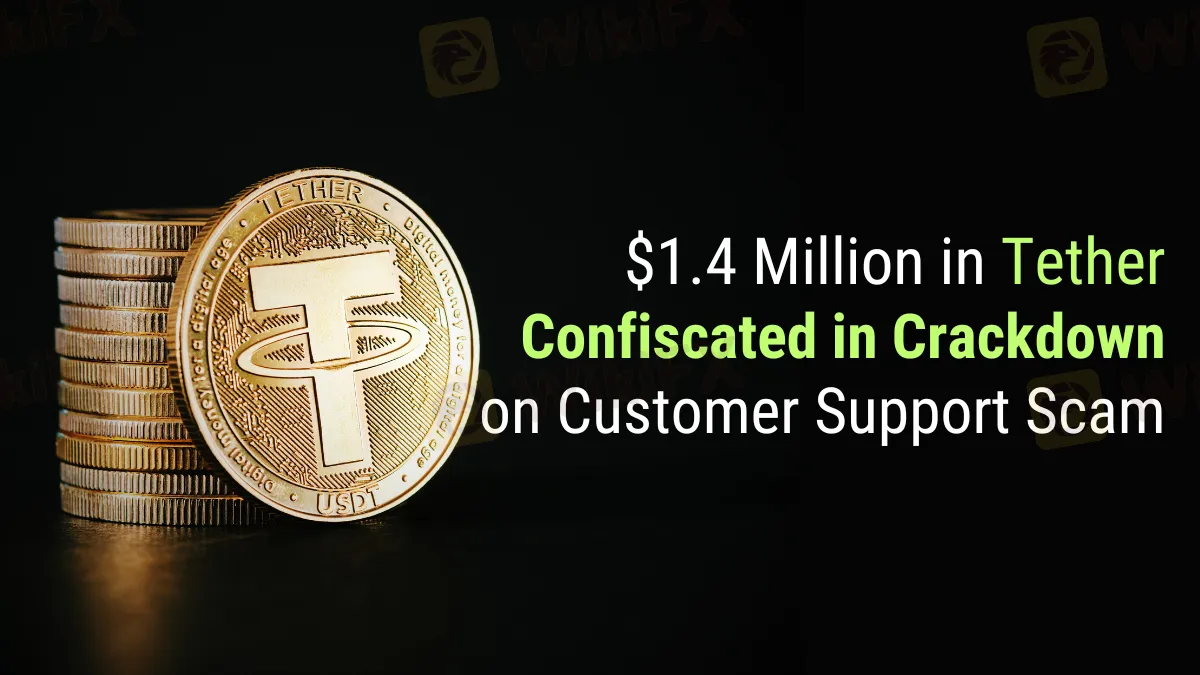简体中文
繁體中文
English
Pусский
日本語
ภาษาไทย
Tiếng Việt
Bahasa Indonesia
Español
हिन्दी
Filippiiniläinen
Français
Deutsch
Português
Türkçe
한국어
العربية
$1.4 Million in Tether Confiscated in Crackdown on Customer Support Scam
Abstract:US Attorney's Office seizes $1.4M in Tether from scam, exposing tactics targeting vulnerable populations. Implications for crypto regulations & DeFi.

In an enormous attempt to stop fraudulent activities, the United States Attorney's Office in Chicago, Illinois, has taken down a customer service scam business and seized about $1.4 million in Tether (USDT). This operation highlights the evolving tactics used by fraudsters in the Internet age, namely targeting the elderly and other vulnerable populations.
Tether, the DOJ, and the FBI were in charge of organizing the theft on March 12. Scam pop-ups said that the victims' computers had taken over as a component of a larger scheme. They informed the victims that their bank accounts were at risk when they called the fictitious customer service number. Following their deception of the victims into thinking USDT would safeguard their property, the scammers asserted their ownership of the tokens.
An uncommon accomplishment in the battle against digital fraud is the successful recovery of USDT from an unhosted digital currency wallet, which sets this instance apart. A January 24 document reveals that the money seized was painstakingly traced to five separate wallets linked to a wire fraud scheme, even if the precise details of the recovery procedure are still unclear. Money laundering may have occurred because intermediate addresses transmitted small amounts of money.
Despite conducting a significant portion of its activities in foreign countries, Tether remains subject to regulatory oversight by the Office of Foreign Assets Control (OFAC) of the United States. The recent sanctioning of Tether's association with Tornado Cash, an Ethereum network coin mixer, by OFAC, underscores the need for international collaboration in the battle against money laundering in the cryptocurrency business.
Future stablecoin rules will provide Tether with significant challenges in the long term. According to recommendations made by organizations like JPMorgan Chase, the government may ultimately favor stablecoins that adhere to AML and Know Your Customer (KYC) regulations. These restrictions are becoming more open. The decentralized finance (DeFi) sector could potentially experience substantial transformations in light of these legal developments, considering the USDT's significance as a collateral and liquidity resource. Ensuring the protection of consumers against fraudulent activities continues to be a principal consideration as the digital banking industry progresses.

Disclaimer:
The views in this article only represent the author's personal views, and do not constitute investment advice on this platform. This platform does not guarantee the accuracy, completeness and timeliness of the information in the article, and will not be liable for any loss caused by the use of or reliance on the information in the article.
Read more

Why More People Are Trading Online Today?
Discover why online trading is booming with tech, AI, and a push for financial freedom. From stocks to crypto, it’s a thrilling hustle for all.

SEC Ends Crypto.com Probe, No Action Taken by Regulator
The SEC has closed its investigation into Crypto.com with no action taken. Crypto.com celebrates regulatory clarity and renewed momentum for the crypto industry.

Bitpanda Secures Full Broker-Dealer License in Dubai
Bitpanda has officially obtained a full broker-dealer license from the Dubai Virtual Assets Regulatory Authority (VARA), marking a significant milestone in its international expansion. This approval, which follows preliminary authorization granted three months earlier, enables the European digital asset exchange to introduce its comprehensive suite of virtual asset services to investors in the United Arab Emirates (UAE).

Interactive Brokers Expands Crypto Trading with Solana, XRP, Cardano, and Dogecoin
Interactive Brokers adds Solana, XRP, Cardano, and Dogecoin to its platform, enabling U.S. and U.K. clients to trade crypto 24/7 with low fees.
WikiFX Broker
Latest News
Why Are Financial Firms Adopting Stablecoins to Enhance Services and Stability?
Experienced Forex Traders Usually Do This Before Making a Lot of Money
Octa vs XM:Face-Off: A Detailed Comparison
When High Returns Go Wrong: How a Finance Manager Lost RM364,000
Bridging Trust, Exploring Best—WikiEXPO Hong Kong 2025 Wraps Up Spectacularly
Fidelity Investments Explores Stablecoin Innovation in Digital Assets Sector
Interactive Brokers Expands Crypto Trading with Solana, XRP, Cardano, and Dogecoin
SEC Ends Crypto.com Probe, No Action Taken by Regulator
Why More People Are Trading Online Today?
Gold Surges to New Highs – Is It Time to Buy?
Currency Calculator







